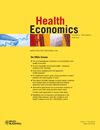
HEALTH ECONOMICS
Scope & Guideline
Driving change with cutting-edge health economics research.
Introduction
Aims and Scopes
- Health Policy Evaluation:
The journal publishes research that assesses the effectiveness and efficiency of health policies, including the implications of interventions like the Affordable Care Act and Medicare on various populations. - Economic Impact on Health Outcomes:
A core focus is on how economic factors influence health outcomes, such as the effects of economic hardship on health and the relationship between employment and health care utilization. - Access and Equity in Health Care:
Research examining disparities in access to health care services based on race, gender, and socioeconomic status is prevalent, highlighting the importance of health equity. - Interventions and Behavioral Economics:
The journal explores how behavioral economics can inform health interventions, such as financial incentives for health care participation and their impact on health behaviors. - Child and Maternal Health Economics:
There is a consistent emphasis on the economics of child and maternal health, focusing on interventions that can improve outcomes in these populations. - Longitudinal and Causal Analysis:
Methodological rigor is emphasized through the use of longitudinal studies and causal inference techniques to understand the long-term impacts of health policies and economic factors.
Trending and Emerging
- Health Equity and Social Determinants:
There is a rising emphasis on health equity and the social determinants of health, as evidenced by increasing publications on access disparities and the impact of socioeconomic factors on health outcomes. - Impact of Policy Interventions:
Research focusing on the unintended consequences and effectiveness of health policy interventions, such as those related to opioid use and mental health, is trending, reflecting current public health crises. - Behavioral Health Economics:
Emerging studies delve into the economics of mental health care, examining how economic factors influence access to care and treatment adherence, particularly in marginalized communities. - Long-term Effects of Health Interventions:
An increasing number of studies are exploring the long-term implications of early-life health interventions, highlighting the importance of childhood health on future economic productivity and health outcomes. - Technology and Health Economics:
The integration of technology in health care, including telehealth and digital health interventions, is gaining attention, particularly in the context of policy evaluations and economic impacts.
Declining or Waning
- Traditional Labor Market Studies:
Research connecting health economics to traditional labor market outcomes, such as job mobility and compensation, has become less prominent, possibly due to a broader shift towards immediate health interventions and their economic evaluations. - Generalized Economic Modeling:
There appears to be a waning interest in broad economic modeling without specific health implications, as the journal increasingly favors studies with direct health policy relevance and real-world applications. - Narrowly Defined Health Conditions:
The focus on specific health conditions, particularly those that are less prevalent or have limited policy implications, seems to be declining as the journal emphasizes more universal health issues and interventions.
Similar Journals

JOURNAL OF HUMAN RESOURCES
Exploring the future of human capital management.JOURNAL OF HUMAN RESOURCES, published by the University of Wisconsin Press, stands as a premier platform for the dissemination of cutting-edge research in the domains of economics, management, and organizational behavior. With an esteemed Impact Factor and ranking in the Q1 category across multiple disciplines, including Economics and Econometrics and Human Resource Management, this journal serves as a critical resource for academics, practitioners, and students alike, delving into vital issues and innovations in workforce management and organizational effectiveness. Since its inception in 1976, the journal has consistently provided invaluable insights that bridge theory and practice, thereby advancing the understanding of human resources within a global context. While the journal operates under a subscription model, it embraces a robust archiving strategy to ensure that its contributions are accessible and enduring. For those engaging with the Journal of Human Resources, it offers a rich tapestry of research that informs best practices and strategic developments, making it an essential read for anyone interested in the evolving landscape of human resources and organizational management.
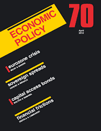
ECONOMIC POLICY
Exploring the Frontiers of Economic ThoughtECONOMIC POLICY is a leading academic journal published by Oxford University Press, focusing on a broad spectrum of topics within the field of economics and related disciplines. With its ISSN 0266-4658 and E-ISSN 1468-0327, the journal serves as a vital platform for disseminating cutting-edge research and innovative policy analysis critical to both scholars and practitioners. As a testament to its quality and significance, ECONOMIC POLICY is classified in the Q1 quartile for both Economics and Econometrics and Management, Monitoring, Policy, and Law, and boasts impressive rankings within Scopus—placing it in the top 25% of its respective fields. Operating from the esteemed Oxford campus in the United Kingdom, the journal has produced a wealth of knowledge since its inception in 1988, with plans to continue shaping economic discourse through 2024 and beyond. While the journal does not offer Open Access options, it remains a cornerstone for anyone dedicated to understanding the complexities of economic policy and its impact on global society.
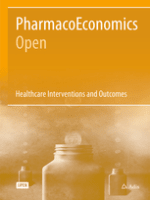
Pharmacoeconomics-Open
Transforming Healthcare Through Collaborative ScholarshipPharmacoeconomics-Open, an esteemed journal published by SPRINGER INT PUBL AG, is a vital resource for scholars and practitioners in the fields of health policy and pharmacology. Since its transition to an Open Access platform in 2017, the journal has aimed to democratize access to valuable research, fostering innovation and collaboration globally. With notable rankings in the 2023 Scopus indices—including Q2 in Health Policy and both categories of Pharmacology—Pharmacoeconomics-Open engages with pressing issues in health economics, providing insights into cost-effectiveness analyses and healthcare decision-making. The journal’s commitment to high-quality, peer-reviewed articles ensures that it remains a significant player in advancing knowledge and understanding within its disciplines, serving as an essential forum for researchers, policymakers, and students alike.

MEDICAL DECISION MAKING
Elevating medical decisions with comprehensive analyses.Medical Decision Making is a premier journal published by SAGE Publications Inc, dedicated to advancing the field of health policy through rigorous research, innovative methodologies, and comprehensive analyses. Since its inception in 1981, it has established itself as a leading platform for disseminating significant findings, and it proudly holds a Q1 ranking in the health policy category, underscoring its commitment to excellence within the academic community. With an impressive Scopus rank of 43 out of 310, the journal ranks in the top 14% of its field, reflecting its influential contributions to medical decision-making processes. Medical Decision Making serves a diverse audience of researchers, practitioners, and policymakers by providing scholarly articles that blend theoretical insights with practical applications, ultimately improving patient care and health outcomes. The journal's dedicated following and its continued relevance through to 2024 position it as an essential resource for anyone vested in the evolution and implementation of effective health policies.
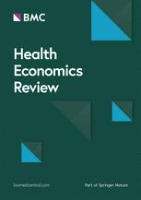
Health Economics Review
Driving change in health systems through collaborative research.Health Economics Review is a premier, peer-reviewed journal dedicated to advancing knowledge and research in the dynamic field of health economics and policy. Published by BMC, this Open Access journal has been a vital resource since 2011, providing a platform for scholars and practitioners to share their findings and insights on pressing health policy issues. With an impressive Q2 ranking in the Health Policy category and a Scopus rank of 113 out of 310, it reflects a solid standing within the academic community, capturing a 63rd percentile ranking that underscores its contribution to the field. The journal covers an extensive range of topics including health systems, economic evaluations, and policy analysis, making it essential reading for researchers, health professionals, and policymakers. Located in Germany, with an operational address at CAMPUS, 4 Crinan St, London, the journal is committed to fostering innovation and collaboration in health economics, thereby shaping a healthier future for all.
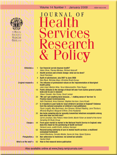
Journal of Health Services Research & Policy
Innovating Solutions for Tomorrow's Health ChallengesJournal of Health Services Research & Policy, published by SAGE Publications Inc., is a leading academic journal dedicated to advancing the field of health services research and policy. With a focus on promoting evidence-based practices and innovative approaches, the journal has been an essential resource for researchers, policymakers, and practitioners since its inception in 1995. The journal is indexed under ISSN 1355-8196 and E-ISSN 1758-1060, reflecting its commitment to accessibility and relevance in the field. As of 2023, it holds a distinguished position in the top quartile in both Health Policy (Q2) and Public Health, Environmental and Occupational Health (Q2), underscoring its contribution to the academic community. With its strong Scopus ranking—placed #88 out of 310 in Health Policy and #222 out of 665 in Public Health—the journal is recognized for publishing impactful research that shapes healthcare landscapes globally. Although it does not operate under an open access model, the Journal of Health Services Research & Policy remains a vital platform for fostering dialogue on pressing health issues and influencing policy decisions, making it a must-read for those looking to stay at the forefront of health services research.
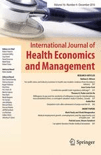
International Journal of Health Economics and Management
Innovating the future of healthcare through economic analysis.International Journal of Health Economics and Management is a premier academic journal published by SPRINGER, focusing on innovative research at the intersection of health economics and management practices. Established in 2015, this journal caters to a diverse range of disciplines, integrating rigorous economic analysis with vital health policy discussions. With an impressive impact factor reflective of its influential publications, it holds a distinguished Q1 ranking in Economics, Econometrics, and Finance, and a Q2 ranking in Health Policy for 2023. The journal provides an open access model, enabling wider dissemination of research findings to academics, policymakers, and healthcare professionals globally. Researchers and students alike will find this journal invaluable for its commitment to advancing knowledge in health economics and improving healthcare management practices through empirical studies and theoretical insights. For more information, or to access articles, please refer to the journal's platform.

REVUE ECONOMIQUE
Connecting Scholars to the Heart of Economic ResearchREVUE ECONOMIQUE, published by PRESSES FOND NAT SCI POLIT in France, is a distinguished academic journal with an ISSN of 0035-2764 and an E-ISSN of 1950-6694. Established in 1974, the journal has evolved significantly over the years, focusing on a diverse range of topics within the field of economics, econometrics, and finance. With its commitment to presenting in-depth research and innovative perspectives, REVUE ECONOMIQUE serves as a vital resource for scholars, professionals, and students seeking to enhance their understanding of economic theories and practices. Although it is currently categorized in the Q4 quartile, ranking 241 out of 288 in the field, the journal aims to foster new dialogues and disseminate valuable insights that contribute to the economic discourse. The journal is not available as open access, but its rich repository of articles continues to attract readers interested in the complexities of economic dynamics. For more information, you can refer to their address at 27 RUE SAINT-GUILLAUME, 75341 PARIS 07, FRANCE.
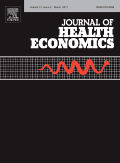
JOURNAL OF HEALTH ECONOMICS
Driving Innovation in Health Economics and Public PolicyJOURNAL OF HEALTH ECONOMICS, published by Elsevier, is a leading peer-reviewed journal in the fields of health policy and public health, with an impressive impact factor indicative of its significance in academic research. Since its inception in 1982, the journal has been a pivotal platform for disseminating impactful research that influences health care policies and economic evaluations, addressing critical topics that drive effective health care delivery and resource allocation. With its current ranking of Q1 in both Health Policy and Public Health, Environmental and Occupational Health, it is recognized among the top journals in these areas, boasting a Scopus rank that places it in the top percentiles of health-related publications. Although it operates under a subscription model, researchers and practitioners benefit from its rich repository of studies and analysis that advance knowledge and practice in health economics. The journal remains committed to fostering interdisciplinary dialogue, making it an invaluable resource for researchers, professionals, and students committed to improving health systems and outcomes.
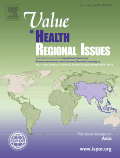
Value in Health Regional Issues
Advancing Value-Based Healthcare Through Regional Insights.Value in Health Regional Issues, published by Elsevier, is an essential academic journal that addresses critical developments in the field of health economics, policy, and pharmaceuticals. With an impressive impact factor, this journal has established itself as a leading platform for disseminating innovative research, evidenced by its Q1 quartile ranking in Economics, Econometrics and Finance and Pharmacology, Toxicology and Pharmaceutics. Founded in 2012, the journal is dedicated to exploring value-based healthcare, focusing on regional perspectives that highlight economic implications and health outcomes. Covering a convergence of multidisciplinary themes, the journal fosters academic collaboration and provides researchers, professionals, and students with access to high-quality, peer-reviewed articles. As it continues to expand its scope through 2025, Value in Health Regional Issues remains a pivotal resource for those seeking to understand and influence health policy and economic frameworks on a regional, national, and global scale.